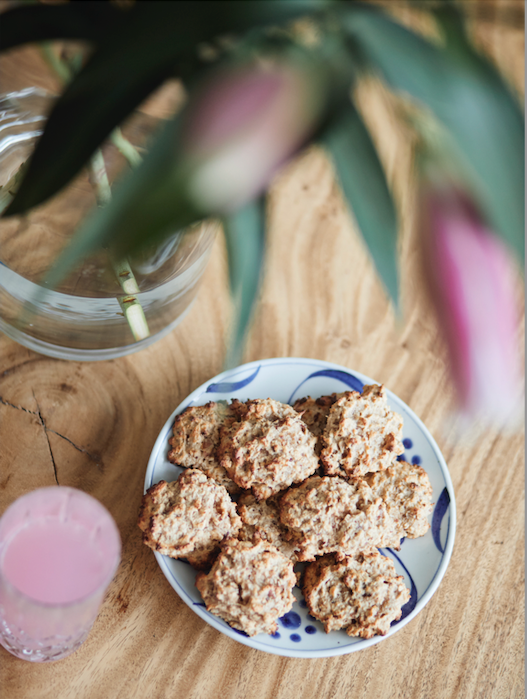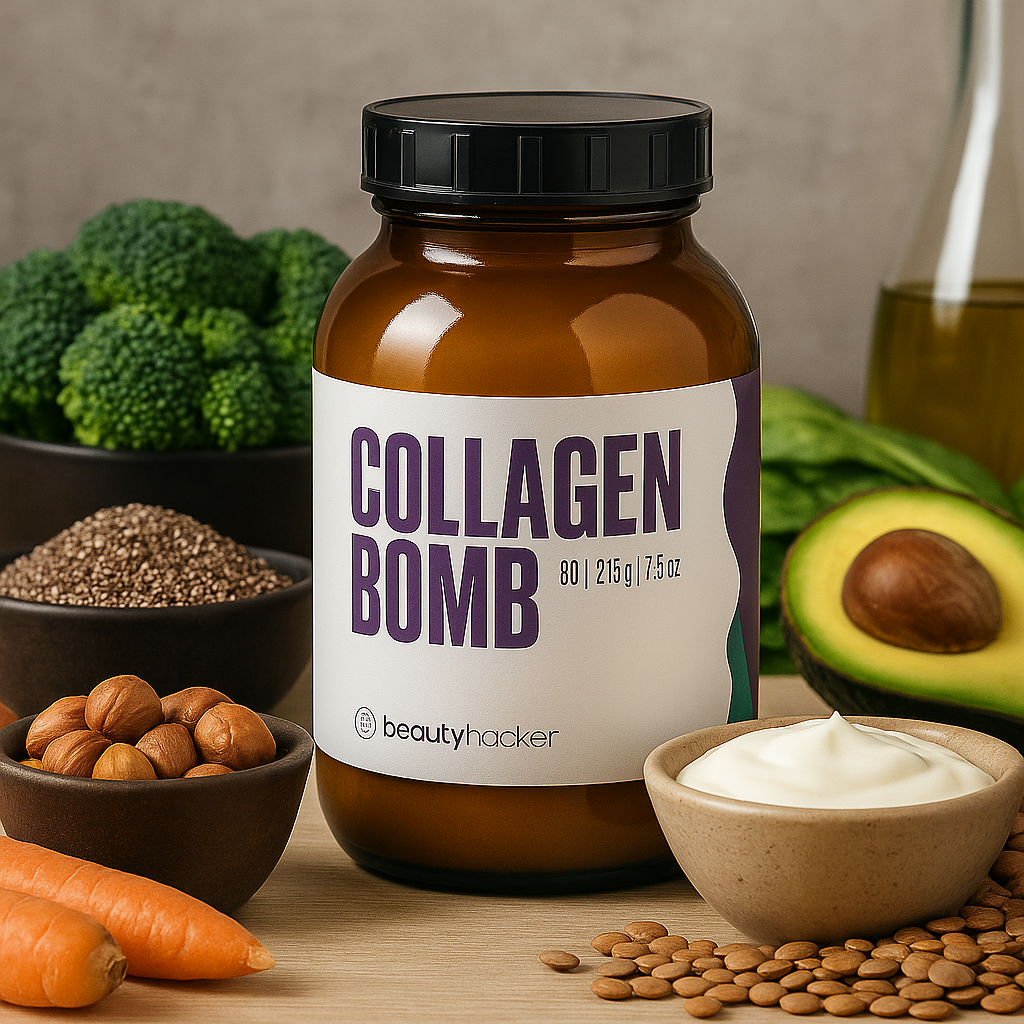5 tips on how to stimulate your collagen formation

The drop in the collagen level in our skin begins relatively early in our mid-20s. On average, there is a loss of around 1.5 percent annually. At the same time, collagen production slows down with age. This effect is also intensified if you live unhealthily.
This is how you naturally stimulate collagen formation.
It is reassuring, however, that collagen can form again. We have valuable tips for you on how to stimulate collagen formation:
1. Foods rich in vitamins
Sweet potatoes, salmon, eggs, but also vegetables such as red peppers, spinach or strawberries, cherries and citrus fruits stimulate collagen formation because they all contain important vitamins and minerals for the production of collagen in our organism. The amino acids and vitamin C are particularly important, because vitamin C maintains our cartilage function, for example. It also ensures that our tissue remains healthy. However, our body cannot produce vitamin C itself. That is why we need to eat enough certain foods.
One of our favorites for beautiful skin and nails is oatmeal. A bowl of oatmeal a day provides us with a number of nutrients. The flakes contain a particularly large number of B vitamins such as biotin (vitamin B7) as well as zinc, silicon and copper. These substances are also important for healthy skin, hair and nails.
In addition, oats have a high content of vitamins B1 and B6 – both strengthen our nervous system and metabolism. Grains also contain essential minerals such as iron, magnesium and calcium. It supports blood formation and is good for the bones. Vegans or athletes who want to build up their muscles are also well advised to have an oatmeal breakfast. Because the flakes are rich in proteins.
And: Oatmeal is a valuable source of antioxidants. They are high in arginine, an amino acid that helps regulate blood flow, heal injuries, remove waste through the kidneys, and boost the immune system.
Among the nuts, we recommend walnuts. Not only are they delicious, they are also really healthy: they contain biotin, vitamin E and omega-3 fatty acids. Biotin is also called vitamin H and not without reason: It is important for the development of skin , hair and nails.
Pumpkin seeds are the perfect source of zinc and iron. The trace element zinc is important for the immune system and the formation of connective tissue. Zinc is also involved in the synthesis of protein - without zinc, no skin cells and no hair are formed. It has a major impact on wound healing. The consequences of a deficiency can be cracked corners of the mouth, poor wound healing, hair loss and brittle nails. 100 grams of pumpkin seeds contain seven milligrams of zinc - this corresponds to the recommended daily amount for women and ten milligrams for men.
Another important nutrient found in pumpkin seeds is iron. If the iron intake is too low, the skin becomes pale, skin diseases, hair loss, brittle nails, cracked corners of the mouth and dry skin are also possible. With 12.5 milligrams of iron per 100 grams, pumpkin seeds are among the top iron-rich foods.
2. Dietary supplements as a booster
If you don't take enough vitamin C or don't like certain foods, a dietary supplement such as a collagen mix with vital substances can also help. This maintains your collagen formation and at the same time supplies your body with important minerals and vitamins. We recommend 5 grams of collagen as a daily dose in combination with vitamin C. The recommended daily amount of vitamin C varies depending on gender and lifestyle. In adults, it is 110 mg per day for men and 95 mg per day for women. Pregnant and breastfeeding women have an increased need, so the recommended intake for pregnant women is 105 mg and for breastfeeding women 125 mg per day. For smokers, a recommended daily intake of 135 mg for women and 155 mg for men is given (source: German Society for Nutrition). In addition to vitamin C, vitamin E and zinc are also suitable, as they are important for cell protection and support the immune system. Our Beautyhacker Collagen Drink contains the appropriate daily amounts and can be dosed perfectly with the powder sticks:
https://www.beautyhacker.de/products/wildberry-collagen
We always have suitable recipes with the collagen drink for you here in the blog section or in Katja and Nela's videos.
3. Sufficient moisture
Dehydration can cause your skin to dry out, causing wrinkles to appear. The motto is to drink plenty of water throughout the day – preferably 1.5 liters per day. Why not have a delicious collagen drink dissolved in a glass of water first thing in the morning? Foods with a high water content such as melons, cucumbers, zucchini and tomatoes also help.
4. Red light therapy
The classic red light lamp emits heat in the form of infrared radiation. Exposing a part of the skin to this heat leads to vasodilatation and thus to increased blood flow to the affected area. Possible positive effects are:
- Promotion of collagen formation
- reducing inflammation
- more energy and therefore more well-being
- a better complexion
- faster muscle regeneration
5. Face massages
How about a facial massage to prevent wrinkles on your face? Massage strengthens muscles, stimulates blood circulation and stimulates collagen production. Our tip: the Gua Sha stone. Gua Sha has been popular for thousands of years. Its origin is in Asia. The Gua Sha massage is supposed to give a natural anti-aging effect and glow, eliminate more pollutants and toxins, relieve tension and have a skin-tightening effect. In addition, it offers you a wonderful opportunity to create your own personal oasis of well-being, even on particularly stressful and challenging days.
More information about the stone and its application can be found here:



